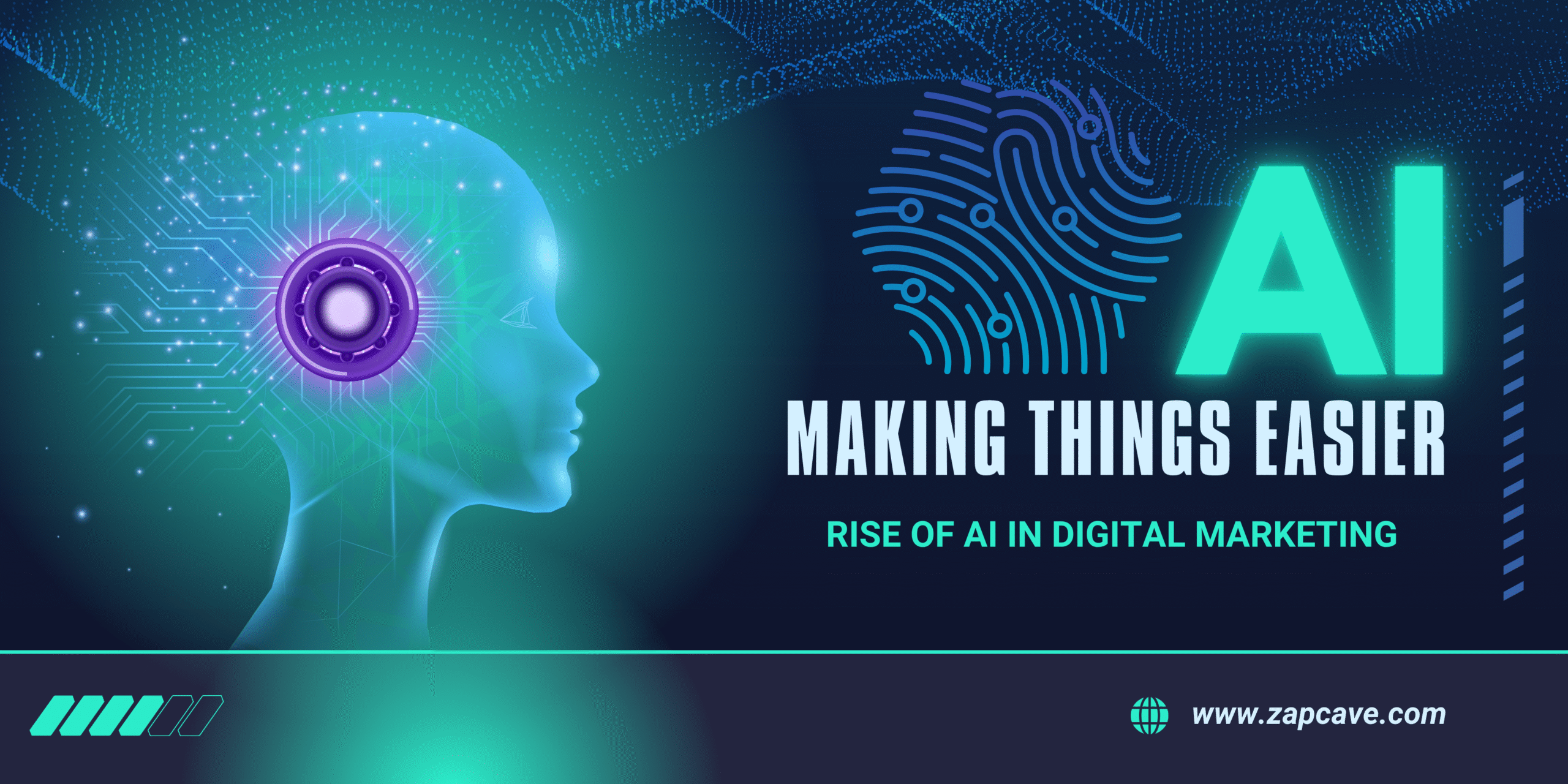
Artificial Intelligence (AI) is no longer just a buzzword in the tech world — it’s transforming the way businesses connect with customers. In digital marketing, AI has shifted from being an optional tool to becoming a powerful driver of growth, efficiency, and personalization. But like any revolutionary technology, it comes with both exciting opportunities and potential risks.
Gone are the days of generic ads. AI algorithms can now analyze user data, browsing patterns, and buying behavior to deliver highly personalized content. This allows brands to reach the right people with tailored messages exactly when they’re most likely to engage.”
With AI-powered platforms like Google Ads and Facebook Ads, marketers can reach specific customer segments more effectively. AI helps identify which audiences are most likely to convert, ensuring every marketing dollar is spent wisely.
AI tools like ChatGPT, Jasper, and Writesonic are revolutionizing content creation. They can assist in writing blogs, social media posts, ad copies, and even SEO-optimized product descriptions — helping marketers save time while improving quality.
AI can process massive amounts of data within seconds. This allows marketers to track campaign performance instantly and make quick adjustments to improve results, something traditional analytics could never do in real time.
AI-driven chatbots can handle customer queries 24/7, providing quick responses and improving user experience. This also allows human agents to dedicate their time to handling more complex and high-value customer concerns
AI thrives on data, but collecting and using personal information raises privacy issues. Mismanagement can lead to legal trouble and damage a brand’s reputation.
While automation saves time, too much dependence on AI can lead to generic, less human interactions. Customers still value authentic, human connections.
If the data fed into AI systems is biased, the output will be too. This may result in biased targeting or unintentionally leaving out certain audience groups
For small businesses, integrating AI tools and platforms can be expensive. Without proper strategy, the investment may not deliver expected returns.
As AI takes over repetitive marketing tasks, there’s a concern about reducing the need for certain human roles. The challenge is to adapt and reskill the workforce.
The key to leveraging AI in digital marketing lies in balance — using technology to enhance human creativity, not replace it. Businesses that combine AI’s speed and precision with human empathy and strategic thinking will stay ahead in this fast-changing landscape.
AI in digital marketing is a double-edged sword. It offers unmatched opportunities for growth, personalization, and efficiency, but also demands careful consideration of ethical, financial, and strategic factors. Marketers who embrace AI wisely will not only stand out but also future-proof their brands in the competitive digital era.
Opportunities AI Brings to Digital Marketing
1. Hyper-Personalization
Gone are the days of generic ads. AI algorithms can now analyze user data, browsing patterns, and buying behavior to deliver highly personalized content. This allows brands to reach the right people with tailored messages exactly when they’re most likely to engage.”
2. Smarter Ad Targeting
With AI-powered platforms like Google Ads and Facebook Ads, marketers can reach specific customer segments more effectively. AI helps identify which audiences are most likely to convert, ensuring every marketing dollar is spent wisely.
3. Content Creation & Optimization
AI tools like ChatGPT, Jasper, and Writesonic are revolutionizing content creation. They can assist in writing blogs, social media posts, ad copies, and even SEO-optimized product descriptions — helping marketers save time while improving quality.
4. Real-Time Data Analysis
AI can process massive amounts of data within seconds. This allows marketers to track campaign performance instantly and make quick adjustments to improve results, something traditional analytics could never do in real time.
5. Chatbots & Customer Support
AI-driven chatbots can handle customer queries 24/7, providing quick responses and improving user experience. This also allows human agents to dedicate their time to handling more complex and high-value customer concerns
Risks & Challenges of AI in Digital Marketing
1. Data Privacy Concerns
AI thrives on data, but collecting and using personal information raises privacy issues. Mismanagement can lead to legal trouble and damage a brand’s reputation.
2. Over-Reliance on Automation
While automation saves time, too much dependence on AI can lead to generic, less human interactions. Customers still value authentic, human connections.
3. Bias in AI Algorithms
If the data fed into AI systems is biased, the output will be too. This may result in biased targeting or unintentionally leaving out certain audience groups
4. High Implementation Costs
For small businesses, integrating AI tools and platforms can be expensive. Without proper strategy, the investment may not deliver expected returns.
5. Job Displacement
As AI takes over repetitive marketing tasks, there’s a concern about reducing the need for certain human roles. The challenge is to adapt and reskill the workforce.
Finding the Balance
The key to leveraging AI in digital marketing lies in balance — using technology to enhance human creativity, not replace it. Businesses that combine AI’s speed and precision with human empathy and strategic thinking will stay ahead in this fast-changing landscape.
✅ Final Thought:
AI in digital marketing is a double-edged sword. It offers unmatched opportunities for growth, personalization, and efficiency, but also demands careful consideration of ethical, financial, and strategic factors. Marketers who embrace AI wisely will not only stand out but also future-proof their brands in the competitive digital era.
